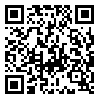Volume 11, Issue 42 (9-2017)
Research on Addiction 2017, 11(42): 125-140 |
Back to browse issues page
Download citation:
BibTeX | RIS | EndNote | Medlars | ProCite | Reference Manager | RefWorks
Send citation to:



BibTeX | RIS | EndNote | Medlars | ProCite | Reference Manager | RefWorks
Send citation to:
Davoodi F, Mehrabizadeh Honarmand M, Hashemi E. The Causal Relationship of Parenting Styles and Insecure Attachment Style with Addiction Potential under the Mediating Role of Personality Traits and Identity Styles in University Students
. Research on Addiction 2017; 11 (42) :125-140
URL: http://etiadpajohi.ir/article-1-1158-en.html
URL: http://etiadpajohi.ir/article-1-1158-en.html
Abstract: (8361 Views)
Objective: The aim of this study was to investigate the causal relationship of parenting styles and insecure attachment style with addiction potential under the mediating role of personality traits and identity styles in students of Shahid Chamran University. Method: This was a correlational study where 178 participants were selected by multistage random sampling method. Iranian addiction potential scale, Parenting Styles Scale, Insecure Attachment Style Scale (ambivalent/anxiety and avoidance), NEO Personality Inventory (neuroticism and openness to experience), and Identity Style Scale (diffusion and premature identity) constituted the data collection tools in this study. Results: The proposed model was tested using path analysis. To test the indirect correlates, Bootstrap test was used. The results indicated that the proposed model was well fitted with the data. Specifically, the results showed that permissive and authoritarian parenting styles and insecure attachment style had a significant direct effect and an indirect effect through neuroticism, openness, diffusion identity, and premature identity on addiction potential. Conclusion: It was concluded that both proximal factors (personality traits) and distal factors (identity and parenting styles) should be considered for the control and treatment of addiction.
Keywords: addiction potential, parenting styles, insecure attachment style, personality traits, identity styles
Type of Study: Research |
Subject:
Special
Received: 2016/06/11 | Accepted: 2017/09/1 | Published: 2017/10/12
Received: 2016/06/11 | Accepted: 2017/09/1 | Published: 2017/10/12
| Rights and permissions | |
 |
This work is licensed under a Creative Commons Attribution-NonCommercial 4.0 International License. |





